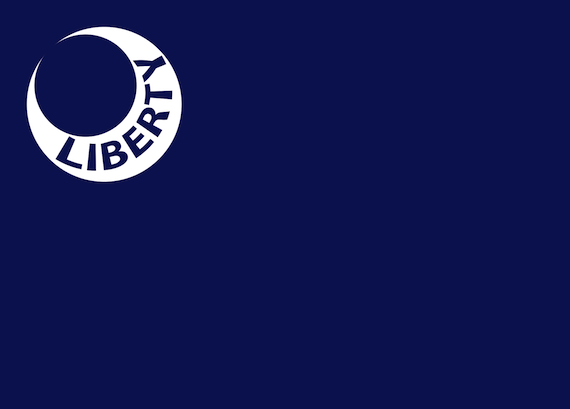By Juan Cole | (Informed Comment) | —
There was a rash of Confederate flag removals on Wednesday. The governor of Alabama had it removed from the statehouse. The governor of Virginia recalled vanity plates with the flag on them. Some Mississippi legislators proposed removing it from the state flag. Amazon, E-Bay and other retailers announced they would not carry the flag or memorabilia with the flag on it. Dismayed supporters of the flag said it represented Southern “valor” in the Civil War.
Here’s an idea. If Southerners want a regional symbol of pride and valor, why not go back to the Moultrie or Liberty flag?
It was flown by South Carolinians in the fight against the Redcoats during the Revolutionary War and was the first American flag to fly over the South.
Best of all, the flag has the word “Liberty” written into the crescent moon, underscoring this key American value, so important for all peoples living in the South. It is better than the Gadsden flag (with the “Don’t Tread on Me” snake) because it expresses a positive value and emotion rather than a negative, reactive one.
The Revolutionary War is one that African Americans can take pride in, even if it did not free the slaves in the South. One fifth of the northern Revolutionary War army was made up of African-Americans. Even in the South, Wikipedia notes, citing historian Eric Foner:
“Because of manpower shortages at sea, both the Continental Navy and Royal Navy signed African Americans into the navy. Even southern colonies, which worried about putting guns into the hands of slaves for the army, had no qualms about using blacks to pilot vessels and to handle the ammunition on ships. In state navies, some blacks served as pilots; South Carolina had significant numbers of black pilots.”
Thus, African-Americans served in one branch of the Continental military under this flag and can take pride in it, and in their role in beginning the process of establishing liberty in the South, a role that continued in the 1860s and the 1960s, through to today.
“The Moultrie Flag
In 1775, Colonel William Moultrie was asked by the Revolutionary Council of Safety to design a flag for the South Carolina troops to use during the American Revolutionary War. Moultrie’s design had the blue of the militia’s uniforms and the crescent. It was first flown at Fort Johnson.
This flag was flown in the defense of a new fortress on Sullivan’s Island, when Moultrie faced off against a British fleet that hadn’t lost a battle in a century.
In the 16-hour battle on June 28, 1776, the flag was shot down, but Sergeant William Jasper ran out into the open, raising it and rallying the troops until it could be mounted again. This gesture was so heroic, saving Charleston, South Carolina, from conquest for four years, that the flag came to be the symbol of the Revolution, and liberty, in the state and the new nation.
Soon popularly known as either the Liberty Flag or Moultrie Flag, it became the standard of the South Carolinian militia, and was presented in Charleston, by Major General Nathanael Greene, when that city was liberated at the end of the war. Greene described it as having been the first American flag to fly over the South.”
—
N.B. Branches of the author’s family have been in the Shenandoah Valley in Northern Virginia since the 18th century and both his parents were born there.




 © 2026 All Rights Reserved
© 2026 All Rights Reserved